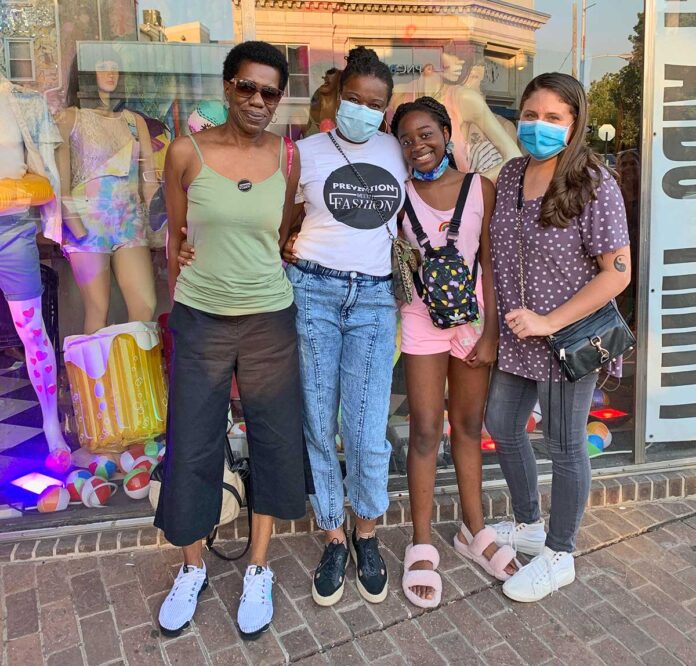Many sex education and social justice organizations exist in Philadelphia, but Prevention Meets Fashion (PMF) seems to be the only one that offers educational and support services to LGBTQ+ people of color using fashion as a jumping off point.
Steeped in the model of “clothing, advocacy, community and education,” PMF offers educational programs on the intersection of social justice and fashion; sexual health; a clothing donation program for queer, trans, Black and indigenous people of color (QTBIPOC) experiencing financial insecurity; a clothing-making program rooted in science, technology art and math; a support group; a speakers bureau and more.
PMF Founder Nhakia Outland recently organized a series of thrifting events in which community members learned about the history of thrifting through PMF’s Instagram, and were invited to shop at a local, minority-owned thrift store that was new to them.
Outland emphasized that queer, BIPOC folks and other minority cultures have deep roots in the world of thrifting. “Jewish people actually started scavenging for clothes and selling them out of carts on the street to feed their families,” Outland said. “Thrifting began as a means to survive.”
Through those thrifting events, Outland also strove to underscore environmental justice and sustainability as related to clothing. “I really want to bring attention to clothing poverty and clothing needs beyond people’s income,” she added. “You can be in this situation regardless of your income. Our basis was community-building.”
On the last day of the thrifting events, Outland invited community members to shop at Philly AIDS Thrift because its owners use their funds to support HIV service and LGBTQ-focused organizations. Philly AIDS Thrift has also shown support for PMF.
Part of the message that Outland promotes through PMF is that fashion is much more meaningful than just clothes, that it’s a method of self-expression and can be part of a person’s identity. Fashion can even be associated with traumatic events, Outland said. As such, she plans to hold the support group Trauma and Fashion this fall, which will home in on how fashion plays a role in trauma and stigma.
Outland said that some masculine of center people expressed interest in Trauma and Fashion because when they’re out shopping for clothes, they find that sales people look at them, make snap judgements about their gender and suggest they shop in certain sections of the store.
Fashion-related stigma in the context of Black bodies is another issue that Outland addresses through PMF.
“Some Black folks have been told, ‘you can’t wear red lipstick because that’s for sex workers,’” Outland explained. “Same thing for fishnet stockings. Or someone might have even had sexual assault or physical abuse that involves clothes.”
When it comes to the relationship between fashion and sexual assault, Outland cited an Italian Supreme Court case in which an 18-year-old girl was raped by her much older driving teacher. The teacher was initially convicted, but when he appealed the sentence, the Chief Judge reversed the decision because the victim was wearing such tight jeans at the time of the incident that she had to have given consent to get them off, in his opinion.
“We have a whole Denim Day because of this,” Outland said. “This is why we educate, this is the basis behind Prevention Meets Fashion.”
Outland’s background in social work and sexuality education drove her to find inventive methods of teaching sex ed through PMF. Her program offers a wealth of topics including sex and sexuality, practicing safe sex through condom use and STD education, reproductive health and justice, human development, the building blocks of healthy relationships, and more.
“Healthy relationships are super important to us,” Outland said. “Before you can get to anything physical, you need to form that foundation. We talk about consent, dating violence, sexual communication, gender roles, culture and exploring values. We want to listen to misconceptions people may have been told growing up.” Outland said that she doesn’t just test people for HIV and send them on their way. “We want to really educate people, talk to people and have them be in community.”
After PMF’s first condom fashion show, attendees told Outland that they initially came to the performance just to see the looks. However, “they left having a conversation with their kids about sex and sexuality,” Outland said.
Miarah Palmer, who studies fashion design at Thomas Jefferson University, interns for PMF where she helps develop fashion ideas for events and activities, and creates content for PMF social media channels.
Palmer discussed how fashion feeds into stereotypes about race and how Black people are permitted to dress in some venues. When it comes to broad generalizations about fashion, Palmer said “people think of one body type, one race, one type of person,” but “fashion is important in all different communities, especially in the Black and LGBTQ+ community. For example, dress codes tie into white supremacy and how schools and other institutions try to police Black bodies and tell people how to dress, how to wear their hair and how to act.”
Educating the public about fashion’s role in policing Black and queer bodies is part of the work that Outland does through PMF.
“When [people of color] try to be our authentic selves through fashion, we’re told that that’s not appropriate in certain spaces,” Outland said. “But then you see our counterparts [doing] it and then they get praise. Our piece is educating because a lot of people don’t know. They [say things like], ‘isn’t there something wrong with [someone] wearing braids?’ And I’m like, ‘there’s nothing wrong with anybody wearing anything.” She explained that the problem arises when some people are allowed to dress a certain way or wear braids, for example, and Black people are told they can’t dress or wear their hair similarly.
Outland mentioned that the CROWN Act, which stands for Create a Respectful and Open World for Natural Hair, has still not been passed in Pennsylvania. If passed, it would expand the class of “race” in the Human Relations Act to encompass hair texture and protective hairstyles such as braids, afros, locs or knots. “As Black people, queer people, the intersections of those, how can we take our power back in fashion,” Outland asked rhetorically.
As PMF continues to evolve, Outland has been adding diversity to the team, according to Palmer.
“[She is] getting more people who are social workers, getting more people who are fashion designers or fashion students and people who are part of the LGBTQ+ community,” Palmer said. “I feel like she’s really striving to diversify the team so people can see ideas from different perspectives.”


